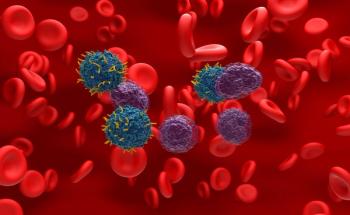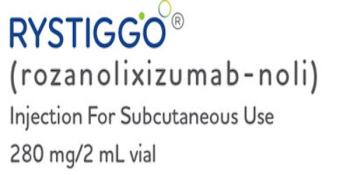
Coverage from the Nashville Regional meeting of the Institute for Value-Based Medicine.

Maggie is a senior editor for The American Journal of Managed Care® (AJMC®) and produces written, video, and podcast content covering several disease states. She joined AJMC® in 2019, and has been with AJMC®’s parent company, MJH Life Sciences®, since 2014, when she started as a copy editor.
She has a BA in English from Penn State University. You can connect with Maggie on LinkedIn.

Coverage from the Nashville Regional meeting of the Institute for Value-Based Medicine.

Richard Lafayette, MD, FACP, Stanford University Medical Center, explains the significance of this second approval in a month for proteinuria reduction.

ECHELON-3 (NCT04404283) principal investigator Craig A. Portell, MD, speaks to the significance of this triplet approval from February as an alternative to more complex and time-consuming regimens in the setting of relapsed/refractory large B-cell lymphoma (R/R LBCL).

In this fourth part of a discussion with The American Journal of Managed Care®, Andrew Kuykendall, MD, clinical researcher at Moffitt Cancer Center and VERIFY investigator, speaks to the impressive patient-reported outcomes seen thus far.

An expert on the intersection of HIV and menopause, Bridgette J. Picou, LVN, ACLPN, The Well Project, explains the importance of overcoming siloed care for women living with HIV and going through menopause.

Carla Nester, MD, MSA, FASN, is coinvestigator for the ongoing APPEAR-C3G trial (NCT04817618), data from which were used to support the FDA’s recent approval of iptacopan (Fabhalta; Novartis) in complement 3 glomerulopathy (C3G).

The randomized control period of the MINT trial has completed, and these newest data describe outcomes among patients who have acetylcholine receptor antibody–positive generalized myasthenia gravis (AChR+ gMG), explained MINT principal investigator Richard Nowak, MD, MS, Yale School of Medicine.

The findings from this single-center retrospective study compare outcomes between 2 groups of patients living with connective tissue disease–associated pulmonary arterial hypertension (CTD-PAH) stratified by their Heart Failure Association–preserved ejection fraction (HFA-PEFF) algorithm score.

Lynae Darbes, PhD, discussed the findings of her study, which found that home-based visits helped to encourage the uptake of HIV testing.

Three decades of data from the Global Burden of Disease Study were analyzed for trends in global, regional, and national burdens in pulmonary arterial hypertension (PAH).

In this comparative analysis, patients with relapsed/refractory large B-cell lymphoma (R/R LBCL) received bridging therapy via radiation or systemic treatment while their chimeric antigen receptor T-cell therapy (CAR T) was being manufactured.

Patient-reported outcomes measures in generalized myasthenia gravis (gMG) are more important than ever, for both those treating and being treated for the chronic autoimmune neuromuscular disorder, to have a more nuanced understanding of experiences and difficulties.

In part 1 of this interview with Katrina Ortblad, ScD, MPH, she addressed bridging gaps in HIV care with pharmacy-based solutions.

In part 3 of a discussion with Andrew Kuykendall, MD, Moffitt Cancer Center, he talks of rusfertide’s ability to enable patients to live a more viable life and free them from being tethered to the need for regular phlebotomies.

These are data to week 26 on the monoclonal antibody and antineoplastic agent; data out to week 52 of the MINT trial will be presented in a late-breaking oral session at the upcoming American Academy of Neurology Annual Meeting.

Strategies to enhance virtual care through quality assurance frameworks, technological innovation, and provider support were laid out in a pair of posters presented at the recent AMGA Annual Conference.

The approval follows the December 2024 priority review designation for this perioperative immunotherapy regimen for patients fighting muscle-invasive bladder cancer.

Mapping care management needs by defining patient populations and then stratifying them according to risk and their needs can help to spur the transformation of a siloed health care system into an integrated system that is able to better provide holistic, value-based care despite the many transitions that continue among hospital, primary, specialty, and community care environments.

Medication nonadherence to oral anticoagulants and oral anti–prostate cancer medication has been scrutinized through new research conducted among patients and health care providers and presented by the American Medical Group Association at its 2025 annual meeting, held March 26-29 in Grapevine, Texas.

Annie Antar, MD, PhD, spoke about how long viral clearance could be an indicator of long COVID, but more research would need to be done to confirm this.

Pulmonary hypertension is a common consequence of interstitial lung disease (PH-ILD), with the highest rate seen among individuals who have idiopathic pulmonary fibrosis. Overall, most cases of PH in the setting of ILD are mild.

In this discussion with Cathy Eng, MD, FACP, FASCO, Vanderbilt-Ingram Cancer Center, she illustrates how Vanderbilt works to specify each individual patient’s cancer care regimen and treatment path.

Rozanolixizumab is a high-affinity humanized immunoglobulin G4 monoclonal antibody and Fc receptor blocker approved to treat anti–acetylcholine receptor– and anti–muscle-specific kinase–positive generalized myasthenia gravis (gMG) in adult patients; administration is subcutaneous and takes approximately 15 minutes.

Data incorporated for this study were collected from 9 centers in the UK focused on third-line and beyond chimeric antigen receptor (CAR) T-cell administration in patients with relapsed/refractory large B-cell lymphoma (LBCL).

To mark the 5-year anniversary of the COVID pandemic, The American Journal of Managed Care® spoke with Noah Greenspan, DPT, PT, CCS, EMT-B, cardiopulmonary physical therapist and director of the Pulmonary Wellness and Rehabilitation Center in New York City.

Treatment guidelines in polycythemia vera currently recommend maintaining hematocrit below 45%, with a higher threshold for men vs women.

Karen Winkfield, MD, PhD, addresses the importance of meeting patients where they are to expand clinical trial participation and remove barriers to trial access.

Annie Antar, MD, PhD, discusses how patients with HIV can have different and longer-lasting symptoms of COVID-19.

Pulmonary arterial hypertension (PAH) can be a challenging complication to manage during pregnancy; women with PAH who are pregnant are considered a high-risk population, and they face higher rates of maternal and fetal complications.

Annie Antar, MD, PhD, discusses the association between the symptoms of long COVID and HIV status.